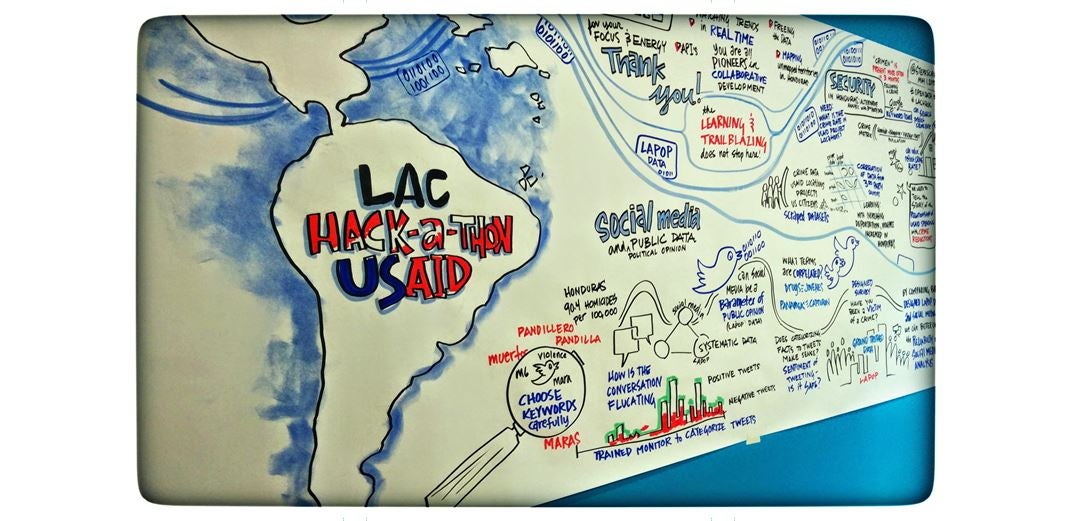As mentioned in an earlier blogpost, the United States Agency for International Development (USAID) recently hosted a first-of-its-kind Open Data Hackathon, focusing on crime and violence in Latin America and the Caribbean. The event attracted over 100 participants from approximately 50 organizations worldwide.
Participants across four different cities formed teams based on skill sets and interests to create eight unique projects in less than 48 hours.
The eight projects, featured below, illustrate how open data can help understand crime in the region. The datasets mentioned in this blog can be found in USAID’s Development Data Library.
1 Visualizations of Northern Triangle Perceptions of Crime and Violence
This winning project demonstrated the impact of violence in the Northern Triangle countries of El Salvador, Guatemala, and Honduras. The team created simple but compelling visualizations of perceptions of crime and violence in the Northern Triangle using datasets from the USAID-funded Latin American Public Opinion Project (LAPOP). The group created images from the public opinion data to generate visual insight about the Northern Triangle. Their storyboard highlights perceptions of personal and national economics, corruption, trust in local institutions and basic socio-demographic information.
2 Social Media Mapping
The social media mapping team analyzed the geo-location of real-time tweets in Latin America that had keywords pertaining to crime and violence over a span of 48 hours. This helped generate an improved understanding of what the citizens were sharing publicly and at what times these issues were receiving the most attention. Did you know “violence” is mentioned most frequently and its greatest frequency is between the hours of 10pm and 2am?
3 Real Estate Prices and Crime
The Real Estate Prices and Crime team analyzed real estate pricing and its relation to crime and violence in Mexico. The team also explored the utility of Google Trends as a means of obtaining data that can be more timely than public opinion data and more structured than social media data. See their complete visualization and Hackpad for more information.
4 Crime Rates and USAID Project Geography
This project examined various datasets to provide detailed insight into several aspects of Honduras. Users of the visualization can navigate to the Security Map, which shows the homicide rate per municipality, United States citizen deaths in Honduras, and USAID project locations. A separate graphic shows various correlations, such as deportation rates relative to homicide rates in specific areas of the country. You can also view a list of all datasets used in their visualizations.
5 Public Opinion and Social Media Data
This team examined correlations between the Latin America Public Opinion Project (LAPOP) data and perceptions in social media. The team analyzed different ways that social media could be used to understand public perception of the region in real time. See more of their work via their Hackpad.
6 Crime Metrics for Impact Analysis
This team analyzed the effectiveness of USAID’s presence geographically by overlaying USAID projects with homicide rates and exploring correlations with spending data. The team collected foreign assistance spending data available from the past 10 years, focusing specifically on peace and security, drug-enforcement initiatives, social welfare, and quality of life improvement spending. The group also created a notional crime metric by incorporating per capita statistics of violent, petty and semi-serious crime into an index. Please see their Hackpad for visualizations and a full explanation of their methodology.
7 Mapping Honduras
The hackathon featured one team dedicated to geocoding the Latin American Public Opinion Project (LAPOP) projects and mapping unmapped streets in Honduras. These mapping efforts are on-going. Please visit their Hackpad for opportunities to get more involved in future mapping projects within the region.
8 Donor Project Mapping and API Enhancement
This team geo-located donor projects and enhanced and created new Application Programming Interfaces (APIs) for USAID public datasets, Economic Analysis and Data Services, and the Foreign Assistance Dashboard. You can access more of their work via their Hackpad.
By Alana Marsili, USAID Open Data Specialist.












Leave a Reply